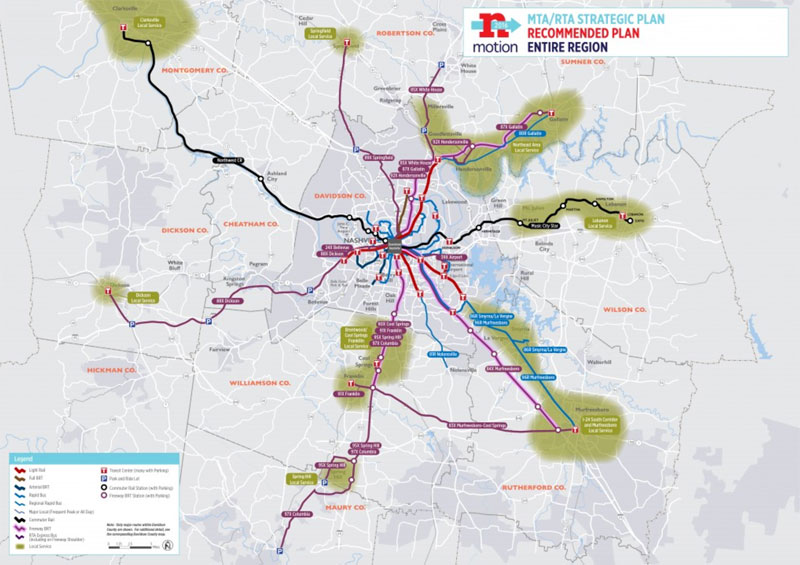It's been more than two years since Nashville's plans for the Amp Bus Rapid Transit line fell apart under a sustained Koch Brothers-funded attack. Since then, the city has elected a new mayor and decided on a new vision for transit. Yesterday, Mayor Megan Barry said a light rail line would be the first project funded under her plan, which is likely to go before voters next year. While that moves forward, there is a lot Nashville can do in the meantime to improve its lackluster bus network.
In the wake of Amp's downfall, Nashville's transportation authorities built a new regional vision for the transit network. Last September, they adopted nMotion, a 25-year, $6 billion blueprint that calls for everything from more frequent bus service to new BRT and light rail lines.
But implementing those plans requires money. Just this week, Republican Governor Bill Haslam signed a transportation funding bill into law that lowers general fund taxes while raising a smaller amount for transportation by hiking the gas tax and other fees. The law also includes a provision that allows local governments to increase taxes for transit projects, so long as the tax proposal secures a majority in a referendum.

Mayor Barry, who leads a joint city-county metro government and has made transit one of her top priorities, is pushing to get a referendum on the ballot next year. Early polls indicate that about two-thirds of residents support it. Yesterday, in her second State of Metro address, she said a new light rail line along Gallatin Pike in East Nashville would be the first branch of a rail network funded under the referendum.
It's a good project -- upgrading Nashville's busiest bus route, according to Barry, and serving a working-class part of town. The question, however, is whether Nashville will also move forward on much-needed bus improvements that could make a difference citywide.
Building up Nashville's bus service would be a quick, cost-effective way to get more people riding transit, which can help ensure the long-term success of big investments in light rail. Last month, the Nashville Metro Transit Authority asked Barry for what the Tennessean called a "whopping" $85.3 million, 427 percent boost to its bus capital program to, among other things, expand the bus fleet and allow the MTA to add new service.
In her budget released this week, Barry ended up giving the transit authority $35 million in capital funds, the newspaper reports. While it includes funding to replace older buses, as well as additional operational money to extend a couple of existing routes, there's no capital funding for expanding the bus fleet.
A big bus boost can't come soon enough: The MTA's ridership, after dipping during the recession, has not resumed its pre-2009 pace. In fact, bus ridership has fallen 2.5 percent over the past year. And Nashville's transit trips per capita are far below similarly-sized regions like Salt Lake City, Milwaukee, Providence, Austin, and Charlotte.
If Nashville wants to get more people riding transit, it can't let its bus network slide.






